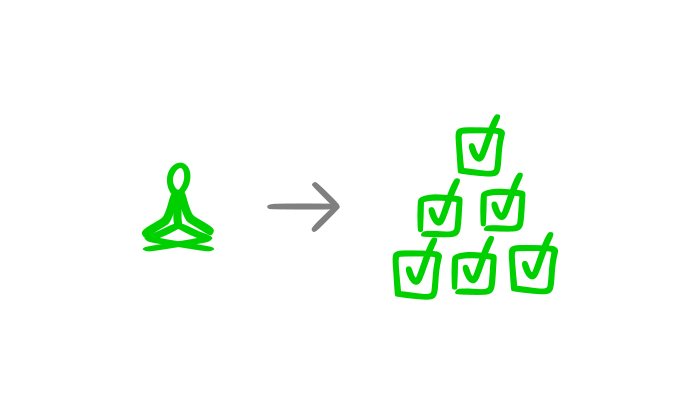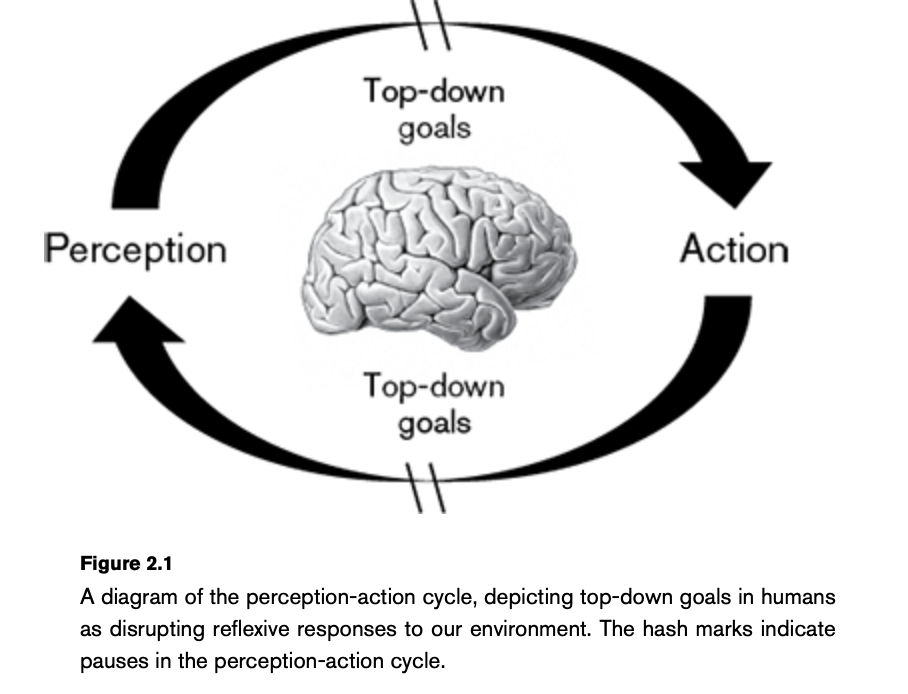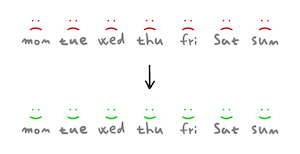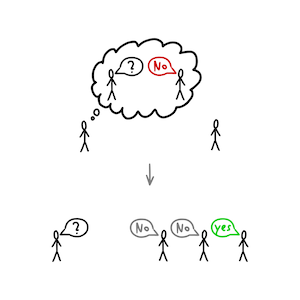How to use meditation to defeat procrastination
The pragmatic case for meditation

You get a notification and you tap it. You get bored with a task and you open a new tab. You get an idea and you go look it up.
Action, reaction, procrastination. A tap, a click,... and boom an hour of your life is gone.
Sound familiar?
Here's what connects all those examples—you're operating on autopilot.
And this is where meditation becomes incredibly useful.
But before we dive in, here's an important note:
You probably already know that meditation could be helpful to you. You just haven't done it because it's never urgent, requires effort, and it is uncomfortable.
We've all been there, so let's not dwell on that. Instead, let's explore how exactly meditation helps, so you know why it's worth the effort.
How meditation helps defeat procrastination
1. You catch negative thoughts sooner
Procrastination often feeds on your inner critic and your self-doubt. Your automatic negative thoughts make you feel so bad that you want to escape through easy mindless distraction.
But when you meditate, you can begin to break this cycle.
Meditation teaches you to notice these counter-productive thoughts as they arise. And noticing is the first step towards stopping these thoughts from snowballing into an avalanche of procrastination.
I'm such an idiot.
Wait. I'm doing it again.
Deep breath.
Okay, what should I do now?
It might not be quite as simple as that if you're used to beating yourself up constantly, but you can start with this at any point. The next time you're mean to yourself, try to notice it, pause, and redirect your attention to something else.
This is much easier with the mental training that is meditation.
2. You get a tangible awareness of future consequences
So much procrastination is rooted in our ability to ignore what will happen in the future. You ignore future consequences by doing something mindless.
However, if you're able to pause for a moment, you can see how a behavior will cause you problems down the line. You become more aware of the cost of procrastination.
Meditation equips you with the ability to be present enough to see those negative consequences. This gives you a chance to make a conscious choice, instead of following an automatic chain of action (stress) and reaction (escape = procrastination).
If you're aware of the cost of procrastinating in the present moment, you can make a different choice. If you aren't, you won't.
3. You consciously handle subconscious thoughts
Meditation is practical because it helps bring hidden thoughts and feelings into your conscious awareness.
If you're not consciously aware that something is bothering you, you'll go on autopilot. You'll react the same way you have in the past. You'll repeat behaviors you learned from your upbringing or your environment. You'll send an angry email, you'll cut someone off, you'll go straight to scrolling... Action, reaction. No pause.
Again, meditation gives you that ability to pause—which is something uniquely human, as neuroscientist Adam Gazzaley describes in his book The Distracted Mind.

Humans have the unique ability to interrupt the Perception—Action cycle that rules all animals. We can create a pause, in which we change our reactions to perceptions. But whether we do that or not all depends on our ability to take a moment and think about our high-level, Top-down goals.
Meditation gives us the ability to do that—to recall our higher level goals and not rush into mindless action.
4. Your remember what you actually wanted to get done
How often do you realize at the end of the day that you haven't done something you meant to?
Most of us do that on a daily basis. It's normal. Our lives are busier than ever before—there are dozens of messaging platforms, people, and commitments... So things fall through the cracks. If you don't create the space to catch them.
Meditation gives us that space. Our mind naturally keeps track of unfinished business (see Zeigarnik effect). If we pause for 5, 10, 15 minutes, unfinished tasks will drift into our mind's eye.
Oh shoot, I wanted to message Hannah.
Once you're aware of it, you can do it. But if you rush from one thing to another the whole day, it's easy to forget (especially the non-urgent tasks).
Meditation allows you to remember what you meant to do.
5. You come up with more creative, less effortful solutions to problems
We often become fixated on one particular solution to a task.
Oh, I need to get this done, and that, before I get to X.
What if you don't?
What if there is a different, simpler approach that requires less effort (so you're not quite as likely to avoid it through procrastination)?
When you give your mind 10 solid minutes to think about a problem, you often realize that there is a better way to approach it.
By quieting the mind, meditation allows creative solutions to emerge from your subconscious mind.
Summary: meditation is not a cure-all, but it is a valuable tool for defeating procrastination
So here are 5 pragmatic reasons why meditation helps you avoid procrastination:
- You catch yourself from going down spirals of negative self-talk
- You get a tangible awareness of future negative consequences in the moment and can pause before you act
- You realize your hidden thoughts and feelings around problem tasks and can deal with them deliberately
- You remember what you wanted to do before the day is over
- You come up with simpler, better ways to deal with overwhelming tasks
And there are other benefits, of course. Being more present with others, being able to avoid future problems by making a different choice in the present, being less stressed by being more detached from problem situations... But these are not directly related to procrastination.
While meditation won't magically get things done for you, it will help you feel less resistance towards difficult tasks and it will help you avoid the negative patterns our minds get caught up in so easily.
That's why it's worth the effort to take 10 or 15 minutes out of your day and meditate (even though it's never urgent.)
If you’re new to meditation, we recommend you start with guided meditation with an app like Oak, Headspace, or Waking Up.
So now you know how meditation aids you in defeating procrastination. Start meditating today and see if you experience at least one of the benefits described above.



